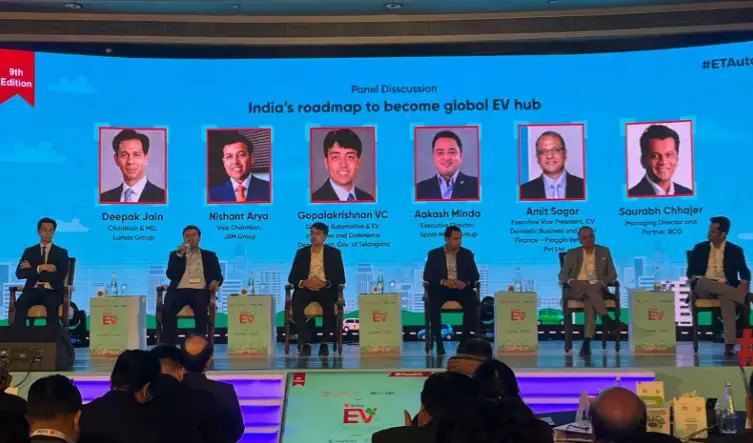
The 9th edition of the ETAuto EV Conclave kicked off today at the Hyatt Regency, New Delhi. During the event, key panelists discussed the strategies needed to position India as a global hub for electric vehicles (EVs).
Scaling the domestic market
Deepak Jain, Chairman & MD, Lumax Group, stressed the urgent need for scalability in the domestic market. He highlighted the importance of building a
robust manufacturing system to support the EV revolution. Jain noted that
government incentives are providing a much-needed push for EV adoption but emphasized the need to create a holistic
ecosystem. “We need to ensure not just component manufacturing but also greater localisation within India,” he added.
India as a powerhouse for EV production
To emerge as a global hub, India requires a strong foundation that includes a
rugged export network, robust supply chains, and efficient production systems, stated Nishant Arya, Vice Chairman, JBM Group. He noted the increasing interest from global players to use India as a manufacturing base for regional markets in
Asia Pacific, the Middle East, and Africa. Arya further emphasised
localisation, skill development, and manufacturing enhancement as pillars for a sustainable EV ecosystem.
India's EV Capital potential
India’s potential as a
global EV capital is attracting the attention of multiple sustainable agencies. Gopalakrishnan VC, Director of Automotive & EV, Industries and Commerce Department, Government of Telangana, highlighted the importance of
investment in R&D to foster innovation in EV and charging infrastructure technologies.
He also stressed the need for
localisation, supply chain strengthening, and workforce upskilling. Telangana’s government is actively working to attract automotive OEMs to the state by providing them with skilled human resources and infrastructure support.
The Three Cs for EV Growth
Aakash Minda, Executive Director, Spark Minda Group, identified
competency, capability, and capacity as the three critical pillars for developing India’s EV industry. These elements must be strengthened across the supply chain and implemented with a demographic focus in different regions.
“The government must support engineering advancements, while Tier 1 and Tier 2 suppliers need to invest in R&D to develop products for the future,” Minda said.
Technological Upgrades in EVs
Drawing a parallel between electric vehicles and mobile phone technology, Amit Sagar, Executive Vice President, Piaggio Vehicles Pvt Ltd, emphasised the need for
continuous upgrades in both hardware and software.
Sagar pointed out the necessity of changing mindsets from internal combustion engines (ICE) to EVs, focusing on
quality, scalability, and long-term domestic demand. He also stressed the importance of a
robust and sustainable charging infrastructure for commercial vehicles, passenger cars, and two-wheelers to accelerate mass EV adoption.
Addressing EV Charging Infrastructure
The lack of adequate
charging infrastructure was identified as a significant barrier to EV adoption. Experts emphasised the need for a comprehensive charging network catering to various vehicle segments, including commercial, passenger, and two-wheelers.
